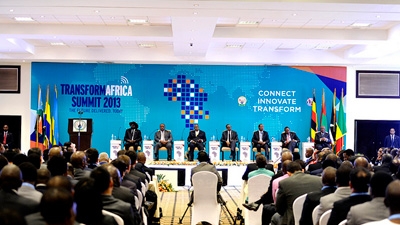Linking the country to the World Wide Web
Says Michel Rogy, World Bank ICT policy adviser and team leader of Gabon’s Central African Backbone (CAB) project, “The development of ICTs is a key component of the Gabon Emergent strategic plan launched by the president upon his election in 2009, a plan that seeks to make Gabon an emerging country in less than a generation.” He adds, “The Gabonese government’s vision entails, as a first step, creating world-class digital infrastructure that will bring Gabon into the heart of the information and communications community; this means it will ensure that the entire country is covered by fiber optic infrastructure and securely linked to the other countries of the subregion and to the global Internet.”
With technical and financial assistance from the World Bank, Gabon has invested roughly US$110 million in infrastructure that will extend broadband network coverage and reduce the cost of communication services. Says Zouera Youssoufou, World Bank Country Manager for Gabon, “This demonstrates the country’s commitment to making new information and communication technologies available to the entire population of Gabon.” In 2012, the World Bank and the Gabonese government signed a US$58 million loan agreement as part of the CAB subregional program. This will connect Gabon to the ACE (Africa Coast-Europe) submarine cable, which links the shores of West Africa to Europe, and will distribute this high-speed capacity via land-based fiber optic cables connecting Libreville, the capital, to Franceville in the country’s interior, close to its border with the Congo. The Gabon government has also financed a fiber optic cable linking Libreville to Port-Gentil, the country’s economic capital, located on Mandji island.
Will tech centers incubate jobs?
The bidding process to build the land-based fiber optic connection is under way. Once completed, this infrastructure will be used, in a public-private partnership, by a private infrastructure operator with a solid track record (international bidding among operators is also in progress) and will be open to all Internet service providers and operators. “This will facilitate an increase in Internet penetration, a reduction in cost, and an improvement in the quality of service,” notes Rogy, “and will therefore lead to the next step of the strategic plan—making Gabon a regional hub for the digital communications economy.”
According to Rogy, the three most promising sectors for “e-development” are health, education, and agriculture. The World Bank will help Gabon’s government to implement the e-health component of its e-government project, in particular by computerizing the Ministry of Health, hospitals, and health centers as well as enabling data transfer and consultation of medical files over this digital infrastructure. “The project will, however, also have a ripple effect on a broad spectrum of health services, content, and applications,” Rogy adds.
To encourage entrepreneurship, the project provides for the creation of ICT incubator sites in the three major cities with fiber optic coverage (Franceville, Port-Gentil, and Libreville) and for the implementation of policy to support innovative digital uses, services, and content. “This will mean creating an environment favorable to the creation of jobs and activities from the development of the e-health sector, which can then be replicated in other sectors such as e-education or e-agriculture,” says Rogy. Another innovative feature: The Gabonese authorities are conferring with the World Bank on aid for ICT learning in local languages, with the aim of making e-development accessible to the entire Gabonese population.
At the Broadband Summit organized in Geneva in 2011 by the International Telecommunications Union, the United Nations agency for development of information and communication technologies, Gabon’s president promised “all Gabonese citizens the inalienable right to the megabyte,” meaning high-speed Internet access.
[i] Gabon, the fifth-largest oil producer in sub-Saharan Africa, remains heavily dependent on oil revenue. In the past five years, the oil sector accounted for 80 percent of exports, 45 percent of GDP, and 60 percent of budget revenue.
[ii] On the same date, the country tallied 2,542,638 telephone service customers. This figure, which far exceeds the total population, is explained by the fact that four mobile providers operate in Gabon and customers hold SIM cards for several providers at once, a phenomenon observed in all countries where mobile services are largely prepaid.

